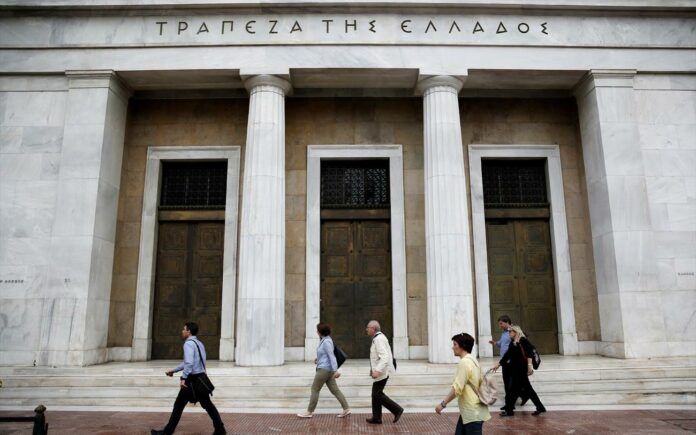The balance of payments deficit eased in February 2019, the Bank of Greece (BoG) announced on Friday, pointing to improved figures for tourism remittances and maritime transport.
At the same time, the balance deficit for goods continued to increase, despite a significant hike in exports, showing that the country is still very dependent on imports.
The announcement by the BoG reads:
Current account
In February 2019, the current account deficit came to €990 million, down by €407 million year-on-year, as a result of the improved services balance and primary income account. By contrast, the deficit of the balance of goods recorded a small increase and the secondary income account turned to a deficit, from a surplus in February 2018.
The deficit of the balance of goods grew, owing to a worsening of the non-oil balance of goods, while the oil balance improved. Exports of goods rose by 10.7% at current prices (4.6% at constant prices); specifically, non-oil exports rose faster than total exports of goods, by 11.9% at current prices (13.5% at constant prices). At the same time, imports of goods rose by 7.7% at current prices (4.5% at constant prices).
The surplus of the services balance increased, mainly as a result of an improvement in the transport balance, which is mostly due to a year-on-year rise of 18.2% in net sea transport receipts. At the same time, the travel services balance also improved remarkably. Specifically, non-residents’ arrivals and relevant receipts rose by 4% and 29.6%, respectively.
Lastly, an improvement of the primary income account is mainly attributable to lower net interest payments on deposits and loans, while a worsening of the secondary income account was a result of a deterioration in the general government account.
In the January-February 2019 period, the current account deficit came to €2.2 billion, up by €79 million year-on-year, as the improved services balance and primary income account only partly offset the deterioration of the balance of goods and the secondary income account.
The deficit of the balance of goods grew, owing to a worsening of the non-oil balance of goods, while the oil balance improved slightly. Exports of goods rose by 3.9% at current prices, although they fell marginally (-0.1%) at constant prices; specifically, non-oil exports rose faster than total exports of goods, by 7.7% at current prices (9.2% at constant prices). Imports of goods rose by 5.4% at current prices (4.1% at constant prices).
The surplus of the services balance increased, primarily as a result of an improvement in the transport balance and, secondarily, in the travel balance. Sea transport receipts rose by 11.5%. At the same time, non-residents’ arrivals and relevant receipts rose by 7% and 41.1%, respectively.
Lastly, an improvement of the primary income account is attributable to lower net payments for interest, dividend and profits, while the worsening of the secondary income account was a result of a deterioration in the general government account.
Capital account
In February 2019, the capital account registered a small deficit of €6.4 million, compared with €4.3 million year-on-year. In the January-February 2019 period, the capital account recorded a surplus of €254 million, up by €74 million year-on-year.
Combined current and capital account
In February 2019, the combined current and capital account (corresponding to the economy’s external financing requirements) showed a deficit of €997 million, down by €405 million year-on-year. In the January-February 2019 period, the deficit stood at €1.9 billion, almost unchanged year-on-year.
Financial account
In February 2019, under direct investment, residents’ external assets decreased by €26 million. The most important transaction was the sale of a Piraeus Bank subsidiary, Tirana Bank Sh.A., to Balfin Sh.p.k. and Komercijalna Banka AD. Moreover, a €195 million increase was registered in residents’ external liabilities (non-residents’ direct investment in Greece), without any remarkable transactions.
Under portfolio investment, a decrease in residents’ external assets is chiefly attributable to a decline of €548 million in residents’ holdings of foreign bonds and Treasury bills. An increase in residents’ external liabilities is mainly due to a rise of €2.6 billion in non-residents’ holdings of Greek government bonds and Treasury bills.
Under other investment, a decrease in residents’ external assets mainly reflects a decline of €218 million in residents’ (credit institutions, institutional investors and corporations) deposit and repo holdings abroad. A decline in external liabilities is primarily attributable to a drop of €3.2 billion in non-residents’ deposit and repo holdings in Greece (the TARGET account included).
In the January-February 2019 period, under direct investment, an increase of €497 million was recorded in residents’ external liabilities (non-residents’ direct investment in Greece).
Under portfolio investment, a decrease in residents’ external assets is chiefly attributable to a decline of €1.6 billion in residents’ holdings of foreign bonds and Treasury bills. An increase in residents’ external liabilities is mainly due to a rise of €3.2 billion in non-residents’ holdings of Greek government bonds and Treasury bills.
Under other investment, a decrease in residents’ external assets mainly reflects a decline of €1.1 billion in residents’ (credit institutions, institutional investors and corporations) deposit and repo holdings abroad. A decline in external liabilities is primarily attributable to a drop of €4.9 billion in non-residents’ deposit and repo holdings in Greece (the TARGET account included).
At end-February 2019, Greece’s foreign reserve assets stood at €6.5 billion, almost at the same level as in February 2018.













